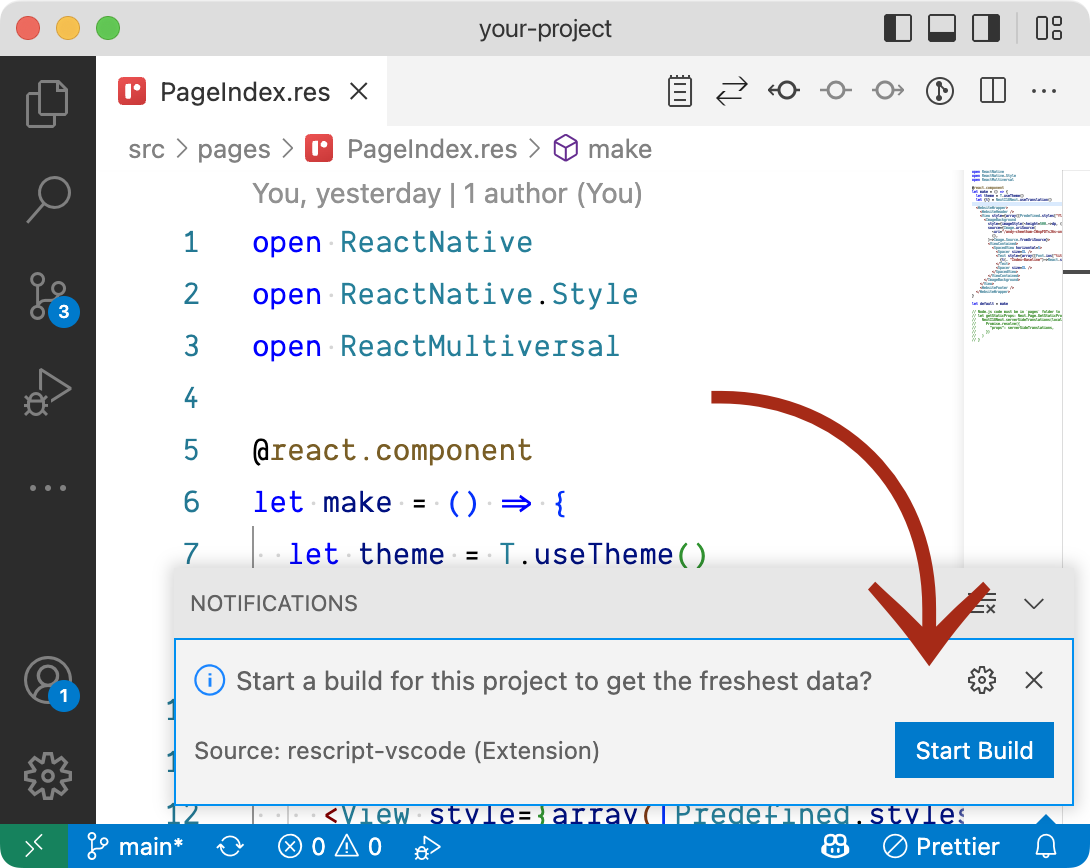Usage
When rescript, @rescript/react and rescript-react-native are installed, you
can run the following command
npm run rescript
⚠️ If this process looks fast to you, don't be surprised, that's because ReScript is fast!
This command should compile all .res files to their .bs.js counterparts.
This means if you have an src/App.res file, you should now have src/App.bs.js
file too.
You may also notice some compilation artifacts:
.bsb.lock.merlinlib/bs
You may want to gitignore all of these:
*.bs.js
.bsb.lock
.merlin
lib/bs
If you used our template, it should be done already.
Automate compilation of *.res files
You have multipes way to not have to think about compilation for your daily workflow
Compile ReScript files via IDE
To get the best development experience possible, we recommend you to use VSCode with ReScript plugin extension. Optionally you can add Flow Language Server extension if you have existing JavaScript covered by Flow.
⚠️ If you don’t want to use VSCode, we still recommend you to get a ReScript editor plugin.
🎉 By having an IDE that handle ReScript compilation, you will not have to run a command in the terminal to handle this & will just have to follow the standard React Native workflow, your ReScript files being compiled to JavaScript.
You will also have inline errors & much more feature that won't be provided by using a CLI workflow.
Vscode workflow
When you open VSCode with the ReScript plugin, you won't have to do anything. The plugin will detect ReScript & will offer you to handle compilation by just clicking a button.

⛑ Even if you decide to use Vscode or a smiliar IDE to ease your day to day development workflow, you should have a look to CLI workflow so you know how it works.
Compile ReScript files via CLI
When you use React Native, you usually always have a terminal opened around with Metro Bundler running, which bundle the JavaScript files.
Now you need to also have a process watching for your ReScript files to compile
then to JavaScript. The easiest way is to rely on ReScript rescript watch
option -w:
npm run rescript build -w
If you are not familiar with ReScript rescript you should know that you might
sometimes have weird compilation errors due to outdated build artifacts. This
should not happen often but in case you are facing something weird, you can try
using rescript clean option
npm run rescript clean
You might want to add this two commands in your package.json scripts:
"scripts": {
"res:clean": "rescript clean",
"res:build": "rescript build",
"res:watch": "rescript build -w",
"start": "react-native start",
"ios": "react-native run-ios",
"android": "react-native run-android",
}
Note: you probably have start already.
If you are doing this change in your scripts, you can now use this development workflow
CLI Development workflow
In one terminal:
npm run res:watch
As soon as .res files are being compiled to .bs.js, you can either start the
project on iOS Simulator (included in Xcode) or an Android Emulator (if you
are unfamiliar with Android Studio, you might be interested by
Genymotion).
In another terminal:
npm run ios
or
npm run android
This commands should open up a virtual device & start React Native metro bundler. This packager will serves the compiled ReScript code to the React Native client.
Now you can start coding by editing files in src/!
Read more about starting the project in your environment of choice.
Note: as soon as you have the app installed in a simulator/emulator, you can just run
npm start
This avoid rebuilding the entire native parts & will just start React Native metro bundler.
Interoperability with JavaScript
Using JavaScript components from Reason
Check out ReScript Import from/Export to JS page.
You can also browse the source of rescript-react-native because that's exactly what this project is doing!
Using ReScript React Native components from JavaScript
Check out ReScript Import from/Export to JS page